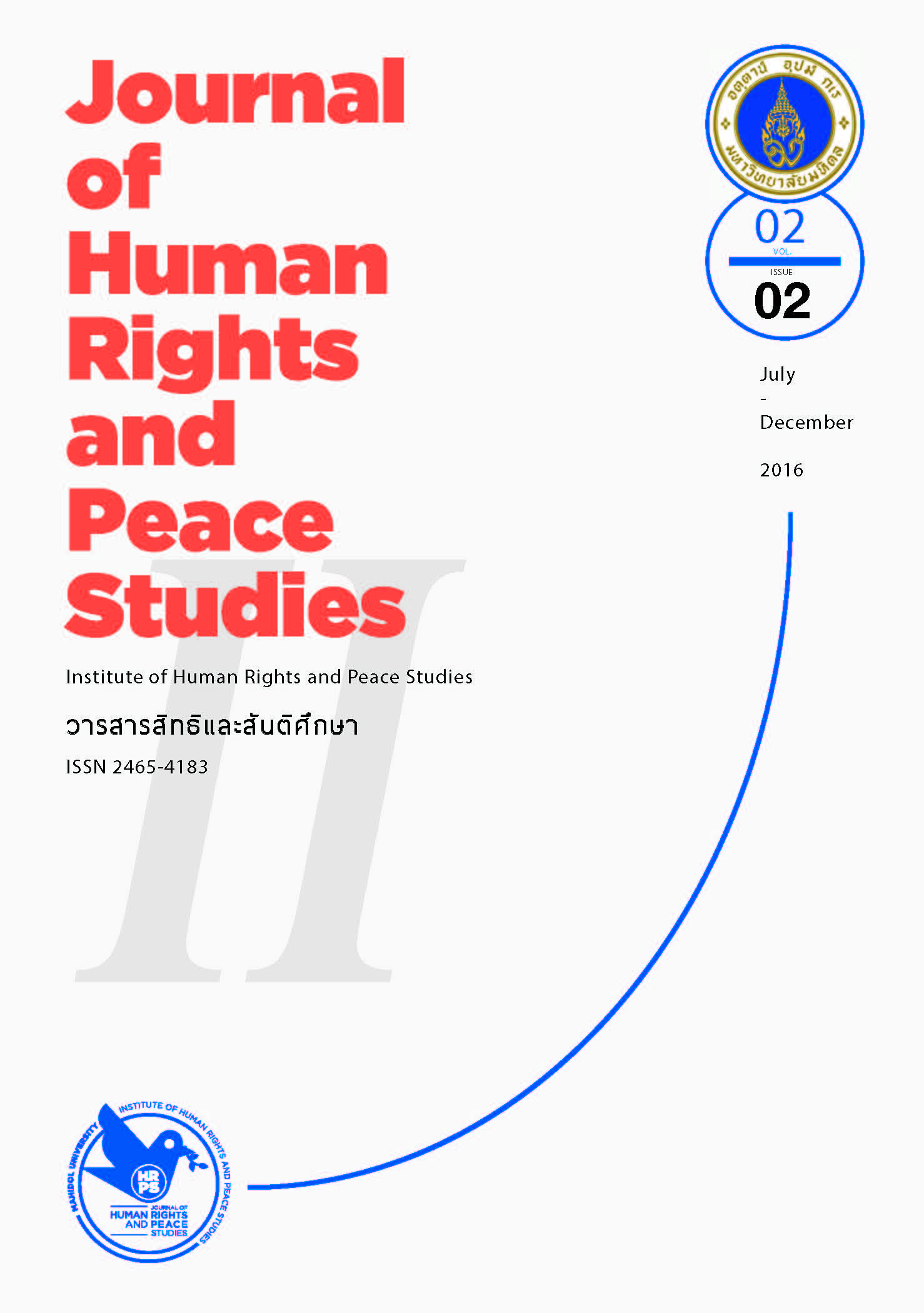Education for Citizenship and Participatory Community Building through Local/Area Based Curriculum: Ref lection from Klong Hok Wa, Pathum Thani Provinc
Main Article Content
Abstract
This article offers field perspective from the research entitled “Approaches to Education for Citizenship and Participatory Community Building through Local/ Area Based Curriculum”. This project employs participatory action method. Syntheses of stories and learning experiences of shared by research participants are important as to demonstrates how Local/Area based curriculum can be used for citizenship construction. Such fieldnote will enable curriculum scholars, education specialist, teachers and concerned actors to reconsider the importance and value of Local/Area Based Curriculum in preparing citizens and developing a sustainable society.
Article Details
The views, opinions, and pictures expressed in this journal are those of the authors and do not necessarily reflect the opinions and viewpoints of the editor and the editorial board. All rights are reserved by the authors and the Institute of Human Rights and Peace Studies of Mahidol University. No part of this journal may be reproduced, stored in a retrieval system, or transmitted in any form or by any means without the prior permission in writing from the journal’s editor, or as expressly permitted by law, or under terms agreed with the appropriate reprographics rights organization. Non-commercial use of information in this journal must be properly referenced.
References
แผนพัฒนาเศรษฐกิจและสังคมแห่งชาติฉบับที่ 11 พุทธศักราช
2554-2559.[ออนไลน์]. แหล่งที่มาhttp://www.nesdb.go.th/
Default.aspx?tabid=395
ฆนัท ธาตุทอง. (2550). การพัฒนาหลักสูตรท้องถิ่น. กรุงเทพฯ: เพชรเกษมการพิมพ์
ชัชวาล ทองดีเลิศ. (2553). ห้องเรียนมีชีวิต. กรุงเทพฯ: สำนักพิมพ์สันติภาพเพื่อสังคม
นันท์นภัส รัตนศิลป์ชัย. (2553). การพัฒนาหลักสูตรท้องถิ่น. เชียงใหม่ :
คณะครุศาสตร์ มหาวิทยาลัยราชภัฏเชียงใหม่
วีรนุช ปิณฑวนิช. (2543). อนาคตของ “หลักสูตรท้องถิ่น” จะไปทางไหน?
นิตยสารสานปฏิรูป ปีที่ 3, (27 มิถุนายน 2543), หน้า 16-23
ศึกษาธิการ, กระทรวง. (2551). หลักสูตรแกนกลางการศึกษาขั้นพื้นฐาน
พุทธศักราช 2551. [ออนไลน์]. แหล่งที่มา: http://www.curriculum51.
net/viewpage.php?t_id=64 [1 สิงหาคม 2557]
สำนักงานกองทุนสนับสนุนการสร้างเสริมสุขภาพ. (2557). เอกสารหมายเลข 8:
7+1 นโยบายสาธารณะ 88 ข้อเสนอ (ปฏิบัติการ) ร่วมสร้างประเทศให้
น่าอยู่. เอกสารอัดสำเนา
สำนักวิชาการและมาตรฐานการศึกษา. (2551). แนวทางในการจัดทำกรอบ
หลักสูตรระดับท้องถิ่นตามหลักสูตรแกนกลางการศึกษาขั้นพื้นฐาน
พุทธศักราช 2551. [ออนไลน์]. แหล่งที่มา: http://www.curriculum51.
net/viewpage.php?t_id=64 [1 สิงหาคม 2557]
อำไพ หรคุณารักษ์.(2550). ความรู้เพื่อประชาชน ชุดการศึกษาเพื่อการพัฒนา
ที่ยั่งยืน ลำดับที่ 1 คิด..มอง..คาดการณ์..เกี่ยวกับ.. “การศึกษาเพื่อการ
พัฒนาที่ยั่งยืนในบริบทไทย”. นนทบุรี: สถาบันสิ่งแวดล้อมไทย
อัญชลี ธรรมะวิธีกุล.(2552). การพัฒนาหลักสูตรท้องถิ่น. (ออนไลน์)เข้าถึงใน
http://panchalee.
wordpress.com/2009/04/10/local_curriculum/ สืบค้นเมื่อวันที่ 2 สิงหาคม 2557
Debra McGregor, Developing Thinking; Developing Learning. McGraw-
Hill International, 2007
Sara Hallermann, John Larmer and John R. Mergendoller, PBL in the
elementary grades.
California: Buck Institute for Education, 2011
UNESCO. (2009). Education for Sustainable Development. [Online]
Available from: http://www.unescobkk.org/education/edu
cation-for-sustainable-development/esd- home/esd-in-thai/.
[2014, August 2]


